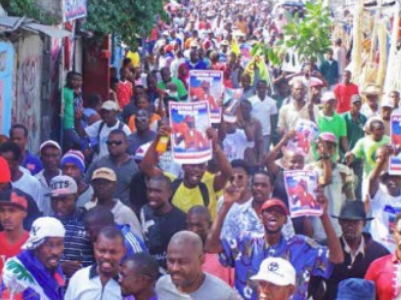Thousands of Haitian people marched through the streets of Port au Prince on January 8 demanding the resignation of President Michel Martelly and the holding of elections blocked for more than three years by his government. The day’s mobilization was organized by several political coalitions–MOPOD and Pitit Dessalin—as well as other popular, political organizations.
A broad, people’s movement calling itself ‘Operation Burkina Faso’ says it is entering a “phase three” of its mass political mobilizations begun last year. The next few days in Haiti will see mass demonstrations across the country pressing for Martelly to go, including on January 12, the five year anniversary of the catastrophic 2010 earthquake.
Operation Burkina Faso scored a victory on Dec. 12 when Prime Minister Laurent Lamothe, a close confidante of Martelly, was forced to resign. Now the presidency is engaged in a series of desperate moves to replace Lamothe and salvage its rule. Martelly has nominated an old operative from a past era of Haitian politics by the name of Evans Paul to replace Lamothe. And it has proposed an interim political agreement that would extend the electoral mandates of senators and legislature deputies that are due to expire on January 12.
But many legislators and senators are refusing the nomination of Paul as well as the political agreement, as is the popular movement. Many of the small parties that dot Haiti’s political landscape are under great pressure by the popular movement to join the demands for the resignation of Martelly and convening of elections.
On January 12, the electoral terms of ten senators and all 99 deputies of Haiti’s legislature will expire. That will leave just ten senators in the 30-seat Senate for all of Haiti’s two houses of Parliament. President Martelly has been saying all along that he is prepared to rule by decree once the Senate and Legislature no longer have quorums. This has added to the political impasse and fueled the rising storm of social protest in the streets.
Since coming to power in March 2011, the Martelly regime has failed to organize a single election in the country as required by the constitution. As a result, there are no elected municipal governments in the country and Parliament will soon be dead.
The electoral dispute stems from Martelly’s failure to create the permanent, representative electoral commission required by the country’s constitution. This failure predates his administration but he has worsened the situation by attempting an end-run around the constitution and the Parliament by stacking an interim electoral commission with appointees. (Background to the electoral commission impasse can be read in two reports in 2014 by the Institute for Justice and Democracy in Haiti and the ACE Electoral Knowledge Network.)
As part of the last-ditch efforts of the regime to save itself, the president of the temporary electoral commission, Anel Alexis Joseph, resigned on Jan. 7. He was appointed by Martelly in 2012 amidst stiff opposition from senators, legislators and Haiti’s association of lawyers.
In another concession, Martelly released some 40 political prisoners in December. They included Jean Robert Vincent, arrested in February 2012.
The big imperialist countries that dominate in United Nations Security Council are taking notice of events in Haiti and are not happy. According to Agence haitienne de presse, the Security Council is sending a special mission to Haiti from Jan. 23 to 25. But in the meantime, it is urging Martelly to do what is necessary to remain in power, including fashioning an agreement to “urgently” hold elections.
Chile’s representative to the UN holds the rotating presidency for the Security Council for the month of January. AHP reports his statement to the press saying, “There is unanimity in the Security Council that the priority today for the Haitian president is to establish a credible calendar for the holding of elections.”
The big powers that lord over political life in Haiti—the United States, Canada and the European Union—were united in their support to a deeply flawed electoral process in Haiti in November 2010/March 2011 that brought Martelly to the presidency. Since then, they have backed Martelly to the hilt. Their new-found concern over the holding of elections will not impress the Haiti people.
The Security Council maintains a police and military occupation force in Haiti known by its acronym ‘MINUSTAH’. As of Dec. 31, 2014, it numbers 4,957 soldiers, 2,256 police, 344 international civilian personnel and 1,169 local civilian staff. The force stands accused of recklessly unleashing the deadly cholera epidemic on Haiti in October 2010. Cholera has killed nearly 9,000 people since then. MINUSTAH failed to screen its foreign soldiers for cholera and its Nepalese contingent allowed its sewage to drain into Haiti’s largest river system. The Security Council and UN Secretary General Ban Ki-Moon deny any and all responsibility.
Watch a BBC News video report on the current situation, here. Read a Jan 8, 2015 report by Amnesty International on the crisis of post-earthquake housing policy in Haiti.



